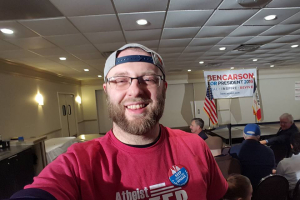With a noticeable emphasis on religious views during pre-caucus gatherings, some American voters are wondering exactly how the future U.S. president will make paramount decisions, proclaiming that God shouldn't play a role in politics, let alone in policy decisions affecting the entire population. One self-professed "out-of-the-closet atheist for the last year and a half," Justin Scott, who lives in Iowa, thought it was a perfect time to ask presidential hopefuls about how they envision making evidence- versus faith-based overall decisions that could prompt personal struggles.
Scott, who grew up within a Lutheran and Catholic upbringing and holds no ill feelings toward any specific religions or church denominations, told The Gospel Herald he has been pleased with the respect received by most of the presidential candidates when he's asked them questions about their decision-making approach as it relates to their deep-seated faiths and religious freedom of U.S. residents.
"I want the president of the United States to spend their time actually working on solving problems, rather than praying about them," said Scott. "We have big issues, such as the justice system and economic inequalities, that our leader will need to focus on. I wanted to try to determine which one of the candidates will best apply cooperation and a bit of humbleness to the job when it comes down to it."
Scott, 34, first caught national and international media attention when he asked presidential candidate Sen. Marco Rubio (R-FL) if he wanted to be pastor-in-chief or commander-in-chief. Scott said he merely was trying to raise awareness on behalf of the desires of atheists, who wish to keep religion separate from U.S. government matters and who represent one of the fastest-growing, yet marginalized, bloc of voters.
He specifically asked Rubio if he would "uphold [atheist's] rights as American, and not pander to one religious group."
To date, the video clip of Scott's question to Rubio has attracted 435,400 views on Scott's YouTube channel, and many spin-off articles. Rubio's camp also shared the clip in other online formats, resulting in another 9.7 million views.
Then when Scott asked Republican candidate Ben Carson during Friday's "Trust in God Townhall with Ben Carson" in Iowa City, Iowa, about how his Christian faith would play a role in his presidency, Carson said he believes there is inherently "no conflict" between God's law and the laws of America.
"Fortunately, our Constitution, the supreme law of the land, was designed by men of faith, and it has a Judeo-Christian foundation. Therefore, there is no conflict there. So it is not a problem," the retired neurosurgeon told the room of potential caucus-goers.
Scott is a Waterloo resident, small business owner and state communications chair of the Secular Coalition for Iowa. He said he would like others to better understand that atheists don't have specific beliefs and thus are seeking to live life without religion playing a role in it. "We just don't believe in a supernatural, supreme being. And we feel the 'Christian privilege' has permeated our society, when our government was designed to be secular."
Scott told ThinkProgress he's been "trying to raise awareness for secular voters," who he said are concerned about the separation of church and state. Secular Coalition for Iowa members attempt to raise the profile of atheist voters and ensure the secular nature of government.
Carson, a Seventh-day Adventist, frequently cites his religious values when speaking to voters. On Friday, Scott asked Carson if there was any situation where "God's law trumps our country's law." Carson responded that Americans have an obligation to obey laws even if they don't agree with them, but that Americans should also fight for laws that promote Judeo-Christian values.
"If we create laws that are contrary to the Judeo-Christian values that we have, then I think that we should fight against those kinds of laws," Carson said.
"I personally believe we still have an obligation to obey the laws whether we agree with them or not, because otherwise we'd be a lawless nation. But that doesn't mean that we shouldn't fight against anything we see as unjust."
Scott said he intentionally waits patiently for the question-and-answer sessions during the town hall meetings at which he has asked questions, and takes his turn. "I don't confront the candidates, and I've been happy with the way nearly all of them have respectfully taken my questions. Most of them have posed with me for photos, and had a little dialog."

Republican presidential candidate Jeb Bush poses with Justin Scott after a recent town hall meeting in Iowa.
"It's not about me, though," he said. "But if I can be a spark to normalize atheism in society, that's good. We are human beings just like everyone else."
Scott said the only two candidates who ignored his questions were Donald Trump and Rand Paul.
Democratic candidates Hillary Clinton and Bernie Sanders both had solid answers to his questions, Scott said. "Hillary took my question head-on, citing that she supported how our government was founded. And Bernie said he stood for pro-secular values, and thought we were facing many of the same struggles of our founding fathers."
Scott said he's been told no other atheists have taken this type of public awareness to his current level during previous caucuses. "I thought for a long time about whether I wanted to put myself out there. But then I decided I could be an upset atheist sitting behind a computer, or I could be a happy, friendly and motivated voter who stands for something."
Being on the cusp of something considered "cutting edge in small town Iowa," is scary, admits Scott. "It's perceived as going against the grain and status-quo, but at least I'm weighing in with my mind and heart."

Atheist Justin Scott is trying to raise awareness of separation of church and state concerns.



















